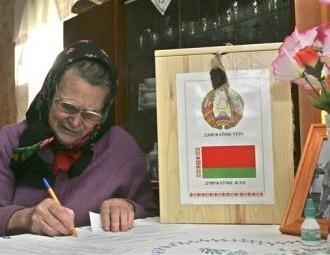Siarhei Alfer: The “success” of local elections lies in pressure, falsifications and fine weather

Famous lawyer voiced three viewpoints on the high turnout at the elections in Belarus.
Observers write about plenty of alcohol and desert polling stations, sales on mass market goods and instructions, in which the “right” candidate was marked. Observers for observers are no tautology, but rather the reality of Belarusan election, which traditionally ends in arrests.
However, the turnout at the election to the local councils is about 77 per cent. According to the Central Election Commission, all in all, 5 million 391 thousand 103 citizens took part in the election; about 32 per cent of them voted preliminarily.
These fantastic figures and hyperactivity of Belarusans was the subject of talk between the EuroBelarus Information Service and Siarhei Alfer, a lawyer and expert in election law.
- Is there a rational explanation to the fact that more than 2 million people voted preliminarily?
- I can assume that a vast number of Belarusan citizens were yearning to get to elections because of the fine weather at the weekend. People decided to spend this time in the country, at their summer cottages, so they voted beforehand. This is the first variant.
The second one is that there was a direction from above to draw in 70 per cent of Belarus’ population into the election; so the leaders of different organizations “recommended” a compulsory but made to appear as voluntary participation in the election for their employees.
Third variant: as the amount of citizens announced officially didn’t come to the election, electoral commissions falsified the turnout.
All the three above variants are realistic, though I can’t say which one of them prevails.
- How is this election different from the former one?
- There are differences if we consider it legally. Law principles were changed: if earlier money were given by state and there was no possibility to use personal electoral assets, no the state stop giving money for making printed production, and candidates can use their personal electoral assets for that.
However, these are minor changes; this election only slightly differs from the former one four years ago. If it were not for the invitation on TV people wouldn’t even know about the ongoing election.
-
03.01
-
07.10
-
22.09
-
17.08
-
12.08
-
30.09








































